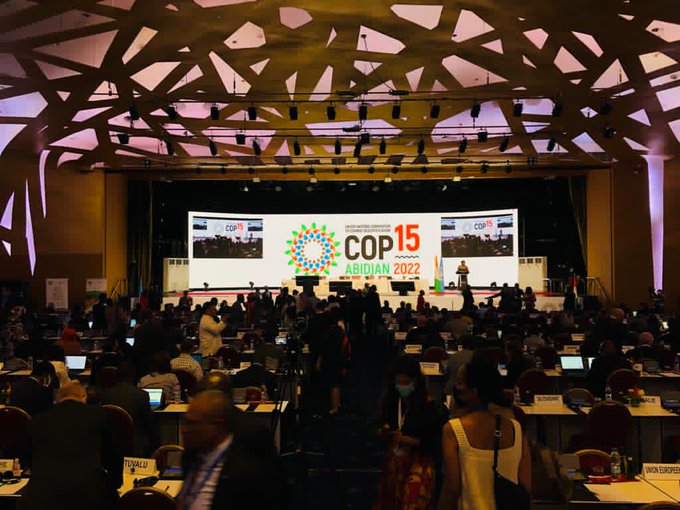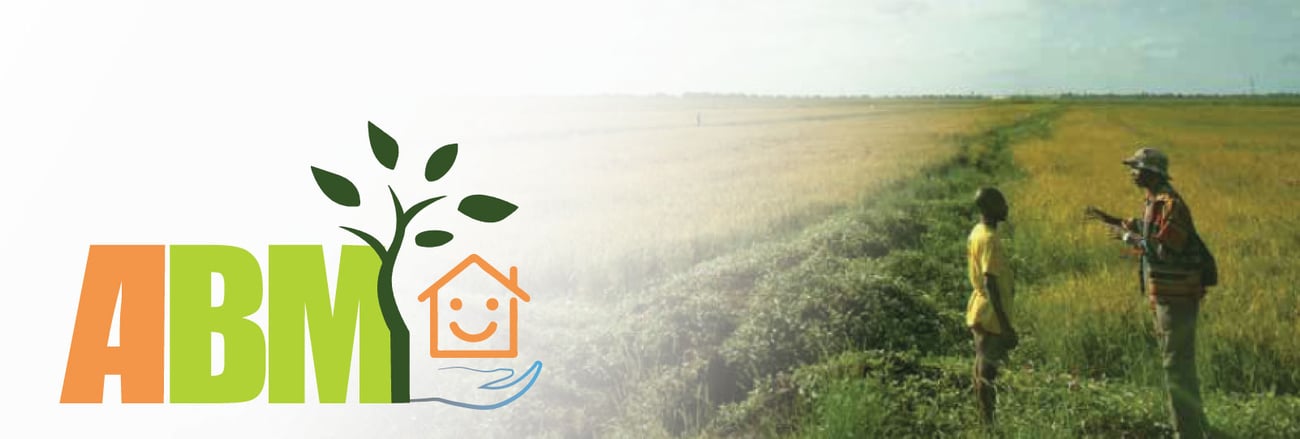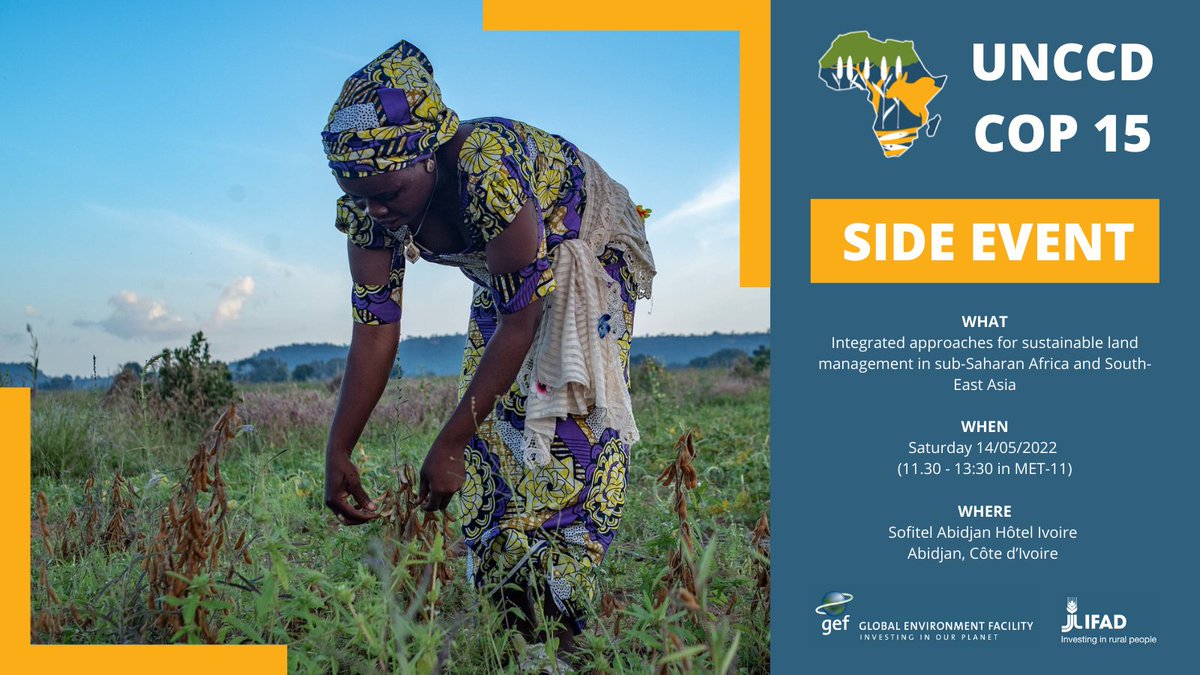9 - 20 May 2022. Abidjan, (Ivory Coast) hosts the 15th session of the Conference of the Parties (COP15) to the United Nations Convention to Combat Desertification (UNCCD).
COP15 is filled with some 2,000 participants, mostly from the African continent, who brighten the meeting rooms with colorful, traditional garments. Among these are heads of state (nine from Africa), ministers and key delegates who have met during the first two days to share what’s happening in their countries and sectors and advocate for the funding, policy and support needed most to fight land degradation on their home turf.
- A hallmark report released by UNCCD in advance of the COP – the Global Land Outlook 2 (GLO2) – is serving as the scientific foundation for discussions. Among other staggering facts, the report found that 40 percent of all ice-free land is degraded, which has direct consequences on half of humanity and poses risks for half of global GDP.
- “Future-proofing” is a term heading up the conference lexicon, referring to the need to proactively protect communities and landscapes from the future effects of climate change.
- The need for gender equity is front and center. Eighty percent of employed women in most least-developed countries rely on agriculture for their livelihoods, but few own their land – for example, only 5 percent do in the Middle East and North Africa. The event opened with its second-ever Gender Caucus examining policy, finance and activism in this sector, and the launch of a new report on the gendered effects of desertification and drought.
- The microphone has been given to youth much more than in COPs past. Sixty percent of Africa’s population is under the age of 25, and this demographic is increasingly viewed as a generational leader. Two of the main concerns voiced by the continent’s youth are the unsustainability of food and agriculture and access to water, as droughts are becoming increasingly severe and desertification is spreading.
- The Great Green Wall – a UNCCD-led effort to restore a green belt across the Sahelian region to prevent the southward spread of the Sahara Desert – remains achievable but needs significantly more support to be realized. Leaders are calling for more funds, national coordination and task forces to ramp up the initiative.
- Indeed, a little bit of money goes a long way. According to the UNCCD Executive Secretary Ibrahim Thiaw, each monetary unit invested in land restoration could return up to 30 times its value, and land restoration globally could generate up to USD 140 trillion. According to the GLO2, USD 1.6 trillion is needed for land restoration over the next eight years.
- President Ouattara announced the Abidjan Legacy Program as a new five-year strategy to restore the country’s forests and food supply through modern methods such as by using the latest tree-planting technology and climate-smart plant varieties. The country aims to raise USD 1.5 billion to support the effort, and the African Development Bank, the E.U., the Green Growth Initiative and the World Bank have already pledged funds.
- The first two days ended with the “Abidjan Call” – a collective assertion from leaders stressing the need to make drought an issue of highest global priority and to continue working toward a net-neutral level of annual land degradation by 2030.
- Key figures presiding over the event have included UNCCD Executive Secretary Ibrahim Thiaw, Ivorian president Alassane Ouattara and first lady Dominique Ouattara, former Finnish president Tarja Kaarina Halonen, president of the UN General Assembly Abdulla Shahid, UN deputy secretary-general Amina Mohammed, young Kenyan conservationist Patricia Kombo, Indigenous rights activist Hindou Oumarou Ibrahim, French president Emmanuel Macron, European Commission president Ursula von der Leyen via video, and spiritual leader and environmentalist Sadhguru.
The UNCCD Science-Policy Interface (SPI)
The UNCCD Science-Policy Interface (SPI) was established at COP11 in 2013 (Namibia).- See SPI members
- The SPI works to translate scientific findings and assessments into policy-relevant recommendations. This includes collaboration with different scientific panels and bodies. It promotes dialogue between scientists and policy makers and other actors on desertification/land degradation and drought (DLDD).
- The mandate of the SPI is to provide the Committee on Science and Technology (CST) with thematic guidance on knowledge sharing requirements, thus helping the Convention to fulfill its mandate.
10 and 11 May 2022 Green BUSINESS FORUM 2022
The business forum highlighted the key role the private sector plays in
developing and implementing sustainable innovations to protect soils and rehabilitate land. Below are some extracts:
This side event showcased different investment models to: 1) de-risking approaches to
mobilize private funding and investments into rural MSMEs and 2) to expand markets, and increase
income and job opportunities for small-scale agriculture.
11/05 Quelles stratégies de mobilisation de la finance verte pour le développement économique de la Côte d’Ivoire ?
Panel 2 : Quels accompagnements des PME, des ETI et de l’écosystème pour la mobilisation des
fonds verts ?
- Modérateur : - Marc DAUBREY, CEO Green Invest
- M. Salimou BAMBA, DG Agence CI PME
- M. Jean-Yves KPALOU, Conseiller Technique en charge de la mobilisation des ressources et de la coopération au Ministère des Eaux et Forêts
- M. Vincent ISTASSE, DG BANK OF AFRICA (BOA-CI)
- Mme ASSEMIEN épse KOUASSI Aurore, Responsable Gouvernance et RSE (BOA-CI)
- M. Fidèle KOUADIO, Chef de service Genre et Environnement du FIRCA
- M. ADAÏ, CEO AGROMAP
N'Diaye Oumar, Directeur Exécutif Adjoint du FIRCA, a participé au panel à la COP15 Abidjan Business Form pour parler d'expérience de l'institution en matière de mobilisation de ressources et de financement de projet adressant les questions climatique dans le cadre de la lutte contre la désertification et la protection de l’environnement.
Innovative financial mechanisms for landscape restoration (AFDB)
This workshop shared innovative ways for raising finance through the Global
Mechanism (GM), Adaptation Benefit Mechanism (ABM) and the voluntary carbon markets. AFDB and partners shared how the ABM can be used to
restore landscapes in the Sahelian region.
- The ABM is a results-based financing mechanism for mobilizing public and private sector finance for projects and programmes enhancing the resilience and adaptation of vulnerable communities and ecosystem by introducing a new incentive - certified adaptation benefits, delivering verified and largely quantified information on progress towards resilience and adaptation, climate finance and other sustainable development goals of the host countries, which can be used for by the buyers for transparency and reporting.
- Payments upon delivery of certified adaptation benefits will create a new revenue stream for activities that would not be realized otherwise.
Fragile Contexts: Putting communities, private sector and resource mobilization center-stage at
COP15 (African Development Bank)
African Development Bank has been and continues to support of its Regional
Member Countries in overcoming the multiplicity of interlinked and context-specific challenges. This
includes national and regional initiatives such as the Great Green Wall (GGW), Technologies for
African Agricultural Transformation (TAAT), the Africa Adaptation Acceleration Program, Desert to
Power (DtP), Special Agro-Industrial Processing Zones among many others.
During COP26 (Glasgow), the AFDB (Climate Change and Green Growth Department
together with the Transition States Coordination Office and the Bank’s Gender, Women and Civil
Society Department) worked with the International Committee of the Red Cross (ICRC) to raise
awareness of the climate funding gap for countries in fragile contexts (see here for more
information). This needs to continue during COP15 (Abidjan) and later this year at COP27 (Sharm El Sheikh).
Side events
Side events organized within the sidelines of the official sessions of the Conference of the Parties (COP) and/or its subsidiary bodies convened by the UNCCD provide an informal opportunity for Parties and accredited observer organizations to exchange information and experiences on diverse issues related to the objectives of the Convention.11/05 Launch of the FAO-UNCCD Technical Guide on Responsible Governance of Tenure and Land Degradation Neutrality
11/05. Side event AFDB’s Climate Change and Green Growth Strategic Framework and plan of action : support the ecosystem restoration agenda in Africa
11/05. Side event by Global Landscapes Forum - GLF Achieving Restoration Objectives through Safeguarding Legitimate Tenure Rights
Smallholders need secure land tenure to ensure investments in ecosystem restoration and food security and land-based adaptation options for millions of people around the world. As the global community scrambles to address multiple crises, responsible land governance is more urgent than ever before. In this context, TMG Research and its partners have developed a human rights-based approach to land governance monitoring, including a reference tool called the Human Rights and Land Navigator, which they will launch during this side event session.
The online tool aims to make the UN-backed Voluntary Guidelines on the Responsible Governance of Tenure of Land, Fisheries, and Forests in the Context of National Food Security (VGGT) more tangible by detailing the human rights on which they are based. During the session, UNCCD stakeholders and human rights actors will discuss the potential of the international human rights system and the new tool to enhance the implementation of the VGGT and safeguard legitimate tenure rights for ecosystem restoration. The event provided practical entry points for land rights defenders, national-level policymakers and human rights bodies to advocate for and monitor progress on land governance instruments.
11/05 Side event IFAD: A new Momentum on the Great Green Wall
The eleven countries of the Great Green Wall (GGW) are among the world's poorest and most vulnerable countries to climate change. The GGW aims to restore 100 million hectares of degraded land, sequester 250 million tonnes of carbon, and create 10 million green jobs in rural areas across the Sahel by 2030.
11/05. Side event CGIAR - Conflict, COVID, Climate Change: Bouncing back from crisis through theAgriculture Breakthrough
Bouncing back from crisis through an Agriculture Breakthrough. An in-person UNCCD COP15 side event hosted by AICCRA, the UK Foreign, Commonwealth and Development Office and Clim-Eat. Unfortunately, livestreaming of this event was not possible. - Robert Zougmoré, West Africa Lead, Accelerating Impact of CGIAR Climate Research for Africa (AICCRA)
- Nahla Noobi, Head of Terrestrial Biodiversity at the Ministry of Climate Change and Environment, United Arab Emirates
- Helena Owen, Development Counsellor, British Embassy, Côte d'Ivoire
- Sebastian Lesch, Head of Division German Federal Ministry for Economic Cooperation and Development (BMZ)
- Joost Nelen, Global Expert on Pastoralism, SNV
- Nora Kaoues, Program Manager, World Bank
- Representative of the FACT Dialogue [TBC]
- Christophe Kouamé, Country Director, Côte d’Ivoire, World Agroforestry Centre (ICRAF) and Convenor, Humid West Africa
13 May 2022. UNEP: The Great Green Investment Opportunity The Great Green Wall: an
overview of current progress and the key investment opportunities for green jobs, women’s
livelihoods, climate resilience, and Integrated Ecosystem Management.
13 May 2022. IRENA - Scaling up clean energy and climate action on the ground
Neutrality – How funders can best support agroecological initiatives by local communities in drylands
16 May 2022. Euroclima + - Nature-based Solutions for restoration in Latin America. Lessons learnt from the EUROCLIMA+ programme
16 May 2022. Agrisud International - Agro-écologie et Approches territoriales : au-delà des mots, des méthodes et des outils pour agir
17 May 2022. CIFOR - Agroecological transitions for dryland resilience
17 May 2022. Adaptation Fund: Enhancing Access to Finance for Sustainable Land Management through the Adaptation Fund to tackle climate change induced land degradation
18 May 2022. World Agroforestry - Restoration of degraded cocoa landscapes: lessons from Côte
d’Ivoire
19 May 2022. Centre Suisse de Recherches Scientifiques- Autonomisation des communautés rurales pour la gestion durable et la valorisation des systèmes naturels et agricoles







No comments:
Post a Comment